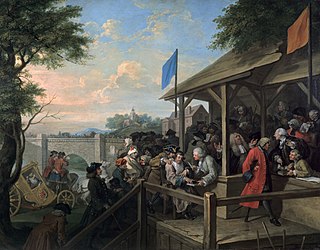Populist Party may refer to:
Ultranationalism or extreme nationalism is an extreme form of nationalism in which a country asserts or maintains detrimental hegemony, supremacy, or other forms of control over other nations to pursue its specific interests. Ultranationalist entities have been associated with the engagement of political violence even during peacetime. The belief system has also been cited as the inspiration for acts of organized mass murder in the context of international conflicts, with the Cambodian genocide being cited as an example.
People's Party, Peoples Party or Popular Party may refer to one of the following political parties.

The Democratic Party is a Greek-Cypriot nationalist, centrist political party in Cyprus founded in 1976 by Spyros Kyprianou.

Political colours are colours used to represent a political ideology, movement or party, either officially or unofficially. They represent the intersection of colour symbolism and political symbolism. Politicians making public appearances will often identify themselves by wearing rosettes, flowers, ties or ribbons in the colour of their political party. Parties in different countries with similar ideologies sometimes use similar colours. As an example the colour red symbolises left-wing ideologies in many countries, while the colour blue is often used for conservatism, the colour yellow is most commonly associated with liberalism and right-libertarianism, and Green politics is named after the ideology's political colour. The political associations of a given colour vary from country to country, and there are exceptions to the general trends, for example red has historically been associated with Christianity, but over time gained association with leftist politics, while the United States differs from other countries in that conservatism is associated with red and liberalism with blue.
This article gives information on liberalism worldwide. It is an overview of parties that adhere to some form of liberalism and is therefore a list of liberal parties around the world.

The Democrat Party, abbreviated to DP, is a liberal conservative Turkish political party, established by Ahmet Nusret Tuna in 1983 as the True Path Party. It succeeded the historical Democrat Party and the Justice Party, two parties with similar ideologies. Their sister party is the Good Party.
Sovereigntism, sovereignism or souverainism is the notion of having control over one's conditions of existence, whether at the level of the self, social group, region, nation or globe. Typically used for describing the acquiring or preserving political independence of a nation or a region, a sovereigntist aims to "take back control" from perceived powerful forces, either against internal subversive minority groups, or from external global governance institutions, federalism and supranational unions. It generally leans instead toward isolationism, and can be associated with certain independence movements, but has also been used to justify violating the independence of other nations.
New Horizons was a radical right-wing populist political party in Cyprus founded in 1996. It aimed for a unitary state of Cyprus and rejected a federation of the Greek Cypriot and the Turkish part. In the legislative elections of 27 May 2001, the party won 3.0% of the popular vote and 1 of 56 seats. In 2005, it merged with Evropaiki Dimokratia to form Evropaiko Komma.
The Centrist Democrat International is a Christian-democratic political international. Until 2001, it was known as the Christian Democrat International (CDI); before 1999, it was known as the Christian Democrat and People's Parties International. This earlier name is still sometimes used colloquially.

Right-wing populism, also called national populism and right-wing nationalism, is a political ideology that combines right-wing politics and populist rhetoric and themes. Its rhetoric employs anti-elitist sentiments, opposition to the Establishment, and speaking to or for the "common people". Recurring themes of right-wing populists include neo-nationalism, social conservatism, economic nationalism and fiscal conservatism. Frequently, they aim to defend a national culture, identity, and economy against perceived attacks by outsiders. Right-wing populism has remained the dominant political force in the Republican Party in the United States since the 2010s.
Labour Party or Labor Party is a name used by many political parties.